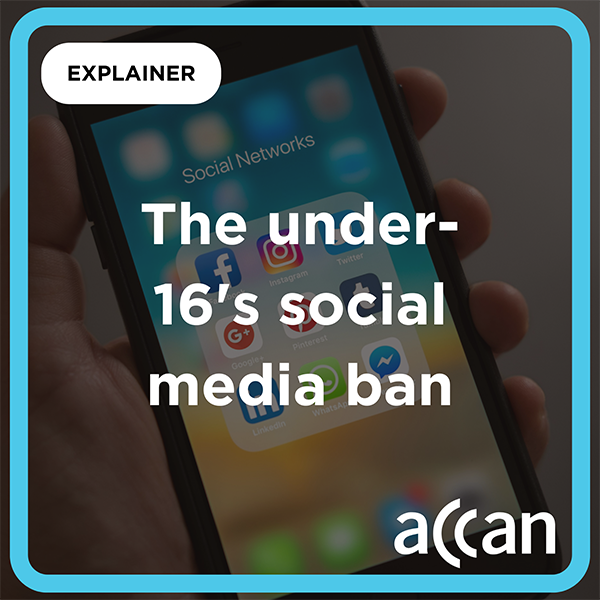- Details
ACCAN recently submitted to the Australian Communications and Media Authority’s (ACMA) proposal to remake the TLN and eight telecommunications standards.
Read more: ACMA’s proposal to remake the TLN and eight telecommunications standards
- Details
Peak communications consumer body ACCAN has welcomed regulatory action against Telstra for significant Triple Zero failings earlier this year, and urged a modernisation of Triple Zero services.
Telstra has been fined more than $3 million for 473 breaches of Triple Zero rules relating to an incident on 1 March 2024, during which Telstra’s Triple Zero call centre was hampered in transferring calls to emergency services for 90 minutes. Customers were unable to access the service as expected.
Read more: Consumers call for Triple Zero modernisation after outage
- Details
Consumers will now have a voice at the table to determine how the NBN can better serve the needs of communities around Australia thanks to a $2.56 million funding grant from the Australian Government to the Australian Communications Consumer Action Network (ACCAN).
As the peak communications consumer body, ACCAN’s new funding will allow it to advocate for the interests of consumers under a new framework of economic regulation approved by the Australian Competition and Consumer Commission (ACCC) known as the Special Access Undertaking (SAU). The framework will propose NBN expenditure, service standards and pricing for the regulatory period commencing 1 July 2026 through to 30 June 2029.
- Details
ACCAN recently commented on the Department of Infrastructure, Transport, Regional Development, Communications and the Arts’ Proposed Amendments to the Powers and Immunities Framework - Consultation Paper (the consultation paper).
ACCAN supports the amendments to the Telecommunications (Low-impact Facilities) Determination 2018 and the Telecommunications Code of Practice 2021 proposed in the consultation paper.
Download: ![]() ACCAN Submission to DITRCDA powers and immunities225.16 KB
ACCAN Submission to DITRCDA powers and immunities225.16 KB
Downlaod:![]() ACCAN Submission to DITRCDA powers and immunities3.78 MB
ACCAN Submission to DITRCDA powers and immunities3.78 MB
- Details
In a significant win for Australians fed up with the onslaught of fake, deceptive and damaging text message scams, the SMS Sender ID Register will be made mandatory.
ACCAN, Australia’s peak communications consumer group, have been calling for the Federal Government to implement a mandatory register throughout 2024. The Register will help consumers more easily determine whether a text message is a scam or legitimate notification from businesses, service providers and government.
Read more: Mandatory SMS Register to ensure Australians get fewer notifications from scammers
- Details
National communications consumer body ACCAN is encouraging consumers to Stop, Check, and Protect to remain scam safe this Black Friday and Christmas sales season.
With nearly $7 billion expected to be spent in the four-day period between Black Friday and Cyber Monday, criminals will be intensifying efforts to steal money from unsuspecting online shoppers.
Read more: Great discounts, good deals and deceptive scams abound this sales season
- Details
The opinion piece below was written by ACCAN CEO Carol Bennett for the Sun Herald. It was originally published on 28 November 2024.
Imposing a ban on social media for those under 16 years of age won’t be simple and it certainly won’t be a silver bullet. But it is the right thing to do.
The government’s proposed ban has polarised policymakers, the media and experts. It has also become a 'play thing’ of the politicking that is now reaching a new levels as we approach an election in early 2025.
Read more: Four reasons for the social media youth ban
Write comment (0 Comments)- Details
 Background
Background
The government has proposed banning Australian children under the age of 16 from using social media platforms. If passed, children would no longer be able to use platforms such as:
- X (formerly Twitter)
- TikTok
- Snapchat
Read more: The under-16’s social media ban
Write comment (0 Comments)- Details
ACCAN recently submitted to the Senate Standing Committees on Environment and Communications' inquiry into the Online Safety Amendment (Social Media Minimum Age) Bill 2024 [Provisions].
ACCAN welcomes the Government's commitment to safeguarding children's online safety. ACCAN advocates for a systems-first approach to improve online safety for all social media users.
ACCAN recommends the Government:
- Amend the Online Safety Act 2021 (Cth) to directly regulate social media services to comply with safety by design measures.
- Prioritise strong privacy measures to protect users from targeted marketing and the exploitation of their data.
Read more: Online Safety Amendment (Social Media Minimum Age) Bill 2024 [Provisions]
- Details
ACCAN has welcomed the transparency of data released this week by the Telecommunications Industry Ombudsman which highlights a small year-on-year jump in complaints as well as the telling figure of 30% of consumers not being able to reach a resolution after it is referred to their telco.
ACCAN CEO Carol Bennett said, “consumers rely on mobile, internet and landline services for essential connectivity and the transparency provided by this report highlights much room for improvement in the management of consumer telco complaints.”
- Details
 The opinion piece below was written by ACCAN CEO Carol Bennett for the Canberra Times. It was originally published on 13 November 2024.
The opinion piece below was written by ACCAN CEO Carol Bennett for the Canberra Times. It was originally published on 13 November 2024.
Australian consumers can be forgiven for feeling angry and disgusted at the behaviour of Australia's second-largest telco - Optus - for mis-selling products to vulnerable consumers.
Australia's consumer watchdog has launched court action alleging that Optus rorted consumers by pushing the sale of products they did not want, need or understand, and pursued many for debts resulting from these sales.
Read more: Internet and phone access can be a matter of life and death
Write comment (0 Comments)- Details
ACCAN has today welcomed the decisive action by the Australian Communications and Media Authority (ACMA) in holding Optus to account and issuing a $12 million fine for risking the welfare of hundreds of consumers during the widespread outage of November 2023. This latest fine signals the need for the company and its new CEO, Steven Rue, to put consumers first in its business practices.
The ACMA has found that 2145 people attempted to reach Triple Zero services during the outage, which it described as ‘preventable’. Optus failed to follow up on the welfare of nearly 370 customers once the outage was resolved, as they are required to do.
ACCAN CEO Carol Bennett said, “We know that new rules which set standards for telco practices during outages are soon to come into effect. Thankfully, this may serve to prevent this occurring in future.”
Read more: Optus cops major Triple Zero fine, must now put consumers first
